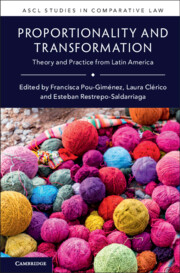Book contents
- Proportionality and Transformation
- Ascl Studies in Comparative Law
- Proportionality and Transformation
- Copyright page
- Contents
- Editors
- Contributors
- Acknowledgments
- Introduction
- Part I Proportionality and Processes of Constitutionalization
- 1 The Standard Reasonableness Test and Proportionality in Argentina
- 2 Proportionality in the Case Law of the Constitutional Court of Ecuador
- 3 Proportionality and Human Rights in Mexico
- 4 Proportionality and the Construction of Democracy
- 5 Proportionality in the Case Law of the Chilean Constitutional Court
- Part II Proportionality in Social Rights and Equality-Based Adjudication
- Part III Proportionality, between Transformation and the Status Quo
- Index
5 - Proportionality in the Case Law of the Chilean Constitutional Court
from Part I - Proportionality and Processes of Constitutionalization
Published online by Cambridge University Press: 27 October 2022
- Proportionality and Transformation
- Ascl Studies in Comparative Law
- Proportionality and Transformation
- Copyright page
- Contents
- Editors
- Contributors
- Acknowledgments
- Introduction
- Part I Proportionality and Processes of Constitutionalization
- 1 The Standard Reasonableness Test and Proportionality in Argentina
- 2 Proportionality in the Case Law of the Constitutional Court of Ecuador
- 3 Proportionality and Human Rights in Mexico
- 4 Proportionality and the Construction of Democracy
- 5 Proportionality in the Case Law of the Chilean Constitutional Court
- Part II Proportionality in Social Rights and Equality-Based Adjudication
- Part III Proportionality, between Transformation and the Status Quo
- Index
Summary
This chapter explores how proportionality analysis has been incorporated into the case law of the Chilean Constitutional Court and what role it has played in the review of bills that sought the introduction of transformative policies in the country. The analysis contrasts judicial reasoning in cases that are part of ordinary practice and in landmark rulings where important projects of the progressive agenda were at stake. We suggest that, while proportionality has been applied inconsistently in both ordinary and high-profile cases, in the latter, it becomes part of the different strategies that the Court uses to mediate political conflicts. Proportionality works here more as a rhetorical tool than as a method of judicial reasoning, and the outcomes of the cases seem to depend more on the political composition of the Court at the time of the decision, the strength of citizen demand for changes and the influence that interest groups exert on the Court.
Keywords
- Type
- Chapter
- Information
- Proportionality and TransformationTheory and Practice from Latin America, pp. 110 - 134Publisher: Cambridge University PressPrint publication year: 2022



